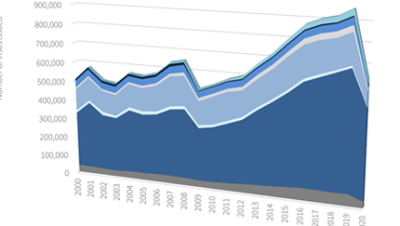Business and the Workforce
Immigrants not only bring diverse skills and perspectives to the U.S. workforce, they often fill employment gaps in crucial fields. We advocate for expanded work visas and related programs so our labor force can continue to benefit from immigrant workers and remain competitive in the global economy

The U.S. Economy Still Needs Highly Skilled Foreign Workers
It might seem that persistently high unemployment rates over the past few years have rendered moot the debate over whether or not the United States really “needs” the highly skilled foreign workers who come here on H-1B temporary visas. But the demand for H-1B workers still far outstrips the current cap of only 65,000 new H-1B visas that can be issued each year. In fact, from fiscal year 1997 to 2011, employers exhausted this quota before the fiscal year was over (except from 2001 to 2003, when the ceiling was temporarily increased). As a number of studies make clear, the presence in a company of highly skilled foreign workers whose abilities and talents complement those of native-born workers actually creates new employment opportunities for American workers. Yet the arbitrary numerical limits placed on H-1Bs are incapable of responding to the changing demand for H-1B workers. This is unfortunate, given that the international competitiveness of the U.S. economy will continue to depend heavily on the contributions of H-1B professionals and other high-skilled workers from abroad for many decades to come. Read More

Visa Programs for High-Skilled Workers
On behalf of AILA, the American Immigration Council, in cooperation with counsel at Steptoe & Johnson LLP, filed a FOIA lawsuit against DHS and USCIS in July 2010 seeking the public release of records concerning agency policies and procedures related to fraud investigations in the H-1B program. Read More

Why Immigrants Can Drive the Green Economy
The 2000 Census found that immigrants, while accounting for 12 percent of the population, made up nearly half of the all scientists and engineers with doctorate degrees. Nearly 70 percent of the men and women who entered the fields of science and engineering from 1995 to 2006 were immigrants. So it should come as no surprise that immigrants will help drive the green revolution. America's young scientists and engineers, especially the ones drawn to emerging industries like alternative energy, tend to speak with an accent. Yet, the connection between immigration and the development and commercialization of alternative energy technology is rarely discussed. In IPC's lastest Perspective on Immigration piece, Richard T. Herman and Robert L. Smith explain how policymakers envision millions of new jobs as the nation pursues renewable energy sources, like wind and solar power, and hightlight the voices that warn that much of the clean-technology talent lies overseas, in nations that began pursuing alternative energy sources decades ago. Read More

A Conversation about the Economic Effects of Immigration on African Americans
Anti-immigrant groups have repeatedly tried to drive a wedge between African Americans and immigrants by capitalizing on the myth that immigrants take American jobs. In a new Perspectives piece for the Immigration Policy Center, Yale Professor Gerald Jaynes dispels the myth that immigrants take “black jobs” and instead suggests we find solutions on how to lift up all low-wage American workers. Most African Americans are very conflicted about the immigration issue. African Americans, who have long espoused strong beliefs in principles of equality of opportunity, the rights of the downtrodden, and respect for humanity viewed in its broadest terms, are especially cognizant of the hypocrisy embedded within ethnocentric demands for an end to immigration. For the nation, immigration‘s economic benefits exceed its costs, but the costs are disproportionately borne by certain social groups and geographic areas. Rather than divide the public over the issue of depriving the country of the benefits to help the few who pay the highest costs, we need to be engaging in a political debate over the kinds and levels of compensatory policies that should be enacted to help low‐income citizens. Read More

Facts about Farmworkers
AgJOBS is a bipartisan, compromise bill that is the result of years of negotiations among farmworkers, growers, and Members of Congress. Get the facts on Farmworkers. Read More

Employment-Based Visa Categories in the United States
Current U.S. immigration law provides several paths for foreign workers to enter the United States for employment purposes on a temporary or permanent basis. This fact sheet provides basic information about how the employment-based U.S. immigration system works. Read More

Today’s Immigrant Woman Entrepreneur
Immigrant women entrepreneurs are rapidly making their mark in the U.S. business sector, in every region of the country and across a large range of industries. Today, immigrant women of the post-1960s wave of immigration comprise one of the fastest growing groups of business owners in the United States. This study examines the rise of immigrant women entrepreneurs and profiles them as a group using data from the 2000 Decennial Census and other sources. Read More

Immigration and the Elderly: Foreign-Born Workers in Long-Term Care
Aging populations and the growing need to provide long-term care to the elderly are among the leading demographic, political, and social challenges facing industrialized countries, including the United States. As of 2004, 34.7 million people in this country had lived to their 65th birthday or beyond, accounting for about 12 percent of the U.S. population. Nearly 90 percent of the elderly population is native-born. By 2030, the number of older people in the United States is likely to double, reaching 72 million—or nearly one out of every five people. The aging of larger numbers of Americans will require significant increases in financial and human resources for healthcare support and other social services. As a result, immigrants will continue to play a significant role in the growth of the U.S. labor force in general and of the direct-care workforce in particular. It is in the best interests of long-term care clients, providers, and workers if governments and private donors foster high-quality training and placement programs rather than leaving the future of the direct-care industry to chance. Read More

Lawsuit on Visa Bulletin, Adjustment of Status
On July 17, 2007, the American Immigration Council was poised to file a lawsuit alleging that the federal government’s refusal to accept tens of thousands of applications for green cards (and discouragement of thousands of other workers from even applying) violated federal statutes, regulations and policies, as well as the U.S. Constitution. Many of these applicants had waited in line for years and were following the government’s rules to obtain a green card. The suit would have argued that the government must comply with its own regulations and policies and accept these adjustment of status (“green card”) applications. Read More

Dollars without Sense: Underestimating the Value of Less-Educated Workers
A recent report from the Heritage Foundation is one in a long line of deeply flawed economic analyses which claim to estimate the contributions and "costs" of workers based solely on the amount of taxes they pay and the value of the public services they utilize. Read More
Make a contribution
Make a direct impact on the lives of immigrants.
